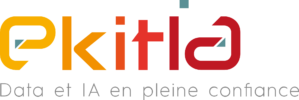Accueil » The Ethics Charter
Ekitia’s Ethical Charter for Data Usage
During the summer of 2019, Ekitia (formerly Occitanie Data) undertook to draw up an Ethical Charter for Data Usage in order to make it one of the pillars of the trust framework aimed at promoting data sharing between public and private structures.
A first version of this Charter, the result of a collaboration between Ekitia and the BIOETHICS research team (a research team specialised in ethical issues related to health innovations and attached to the Toulouse III Paul Sabatier University and INSERM), was published in April 2020 after consultation and validation with and by our founding members.
In order to ensure that the content of this Charter is constantly consistent with technological and legal developments affecting the use of data, as well as with the expectations of stakeholders, its content is intended to be regularly updated. In this context, during the summer of 2020, Ekitia organised co-construction workshops aimed at gathering feedback from sectoral experts (mobility, energy, health, employment and training, environment, and agriculture) on this first version, to identify gaps and areas for improvement.
Taking into account this valuable feedback, we have produced a second version of our Ethical Charter (download link below).
We want to include as many people as possible in the co-construction of this Charter, so we encourage its distribution and sharing (under the terms of the Creative Commons Attribution (Ekitia quote) – Non-Commercial – Non-Modification 4.0 International License) and invite those who wish to do so to complete the contribution form below.
Citizen contribution form to the ethical charter for data use
The ethical charter for data use conceived by Ekitia is the result of a collective effort. It will be revised regularly, according to the contributions of the various consultations and to scientific, technological, social and environmental developments. Everyone can make a contribution to improving the charter. This is the purpose of this form.
Ekitia's Data Use Ethics Charter History

The Ethics Charter
The first version of the Ekitia's Data Use Ethics Charter published in 2020 (Occitanie Data)
The Ethics Charter
The first version of the Ekitia's Data Use Ethics Charter published in 2020 (Occitanie Data)

co-construction process of the charter
Afterworks
Public exchange events on the themes and issues of data ethics
Scenarios
Development of prospective scenarios on the possible uses of data and AI, in collaboration with Prof. Abrassart of the University of Montreal
Workshops
Organisation of creative workshops with experts and citizens based on the prospective scenarios, and to collect their feedback on the charter
The experts behind the development of the charter
Christophe Abrassart
Christophe Abrassart accompanied Ekitia in the elaboration of the co-construction method of our charter and the elaboration of the design fiction method that was applied. He was responsible for the citizen consultation and the co-construction of the Montreal Declaration on Responsible AI.
He is now a professor at the School of Design and co-director of the City Foresight Lab at the Faculty of Planning of the University of Montreal, as well as co-leader of the “Environment, Smart Cities, Territories and Mobilities” Axis at the International Observatory on the Societal Challenges of AI and Digital Technologies (OBVIA).
Emmanuelle Rial-Sebbag
Emmanuelle Rial-Sebbag, Inserm research director (health law), head of the multidisciplinary team BIOETHICS (BIOethics Exploring Trajectories of Health Innovations Challenging Society), UMR 1027 Inserm/Université Paul Sabatier, Toulouse. She questions the legal, ethical and social issues of innovations in the health field including artificial intelligence, Big Data and data protection. She is the scientific leader of the UNESCO Chair “Ethics, Science and Society” and of the Ekitia ethics commission.
Gauthier Chassang
Gauthier Gauthier Chassang is a European Lawyer specialised in health research and biotechnology law, with expertise in legal and ethical issues related to research data protection, biobank governance, and artificial intelligence developments in health.
- Se connecter
- S'enregistrer



